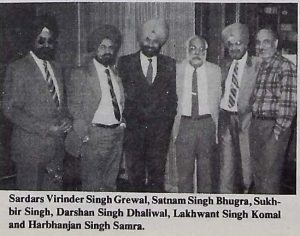
ANN ARBOR: Mr. Darshan Singh Dhaliwal of Milwaukee took up the responsibility of pay $335,000 towards the establishment of the Sikh Studies program at the University of Michigan. He announced his decision at a meeting with Professor Victor Lieberman, Director of the University’s Center for South and Southeast Asian Studies, and Professor Thomas Trautmann, Chairperson of the Department of History.
Also present were Dr, Satnam Singh Bhugra, Dr. Virinder Singh Grewal and Dr. Sukhbir Singh of Indianapolis, the Sikh leaders of the area closely associated with the fund raising for this project, Mr Lakhwant Singh Komal, the president of the Chicago Sikh Gurdwara and Mr. Harbhajan Singh Samra accompanied Mr. Dhaliwal to Ann Arbor.
With the amount now available the Center will create an assistant/associate professor level position to be eventually upgraded to tenured professorship. According to Prof Lieberman the university will open search for the position soon, and the candidate selected will be expected to begin teaching in the fall of 91. The position is likely to be based in the department of Religion and will offer courses related to Sikh religion and history.
Prof Lieberman thanked Mr. Dhaliwal for his generous donation, and also expressed gratitude to the Sikh leaders of the area for their time and energies devoted to the creation of this project. He looked forward to continued cooperation between the community and the university. Prof Lieberman was confident that Michigan with its large program in South Asia will prove to be a hospitable home for the study of Sikhism.
Mr. Dhaliwal’s commitment is a major breakthrough in the Sikh studies project conceived in 1986 when the local Sikh community entered into an agreement with the University of Michigan to establish a program in Sikh Studies. Since then there has been a steady growth in the activities related to Sikh studies at the university.
A series of yearly conferences related to Sikh Studies were held, A major work Sikh Diaspora edited by Gerald Barrier and Verne Dusenberry resulted from the proceedings of the 1986 conference. In addition to .conferences, and occasional lecturers on themes related to Sikhism, Punjabi was introduced in 1988-89, and is presently being taught by Shahin Cole, a native of Lahore, West Punjab.
The news of Mr. Dhaliwal’s commitment was received with great enthusiasm in the area. In the Sunday diwan at the Chicago Gurdwara his decision was warmly welcomed. Dr. Bhugra was especially invited from Lansing to make the formal announcement. The sangat congratulated Mr. Dhaliwal and his family for taking a decision which will be of great significance for the community’s future in this country.
Ina previously arranged program, Mr. Dhaliwal was honored for his contribution to the Gurdwara. Mr. Lakhwant Singh Komal in his presidential remarks claimed that he was proud of the fact that a Sikh from the Chicago sangat led the community in this new and important venture. He took pride in pointing out that this is the first full-fledged program in Sikh Studies to be established in an American university.
This development coincided with the visit of Mr. Gurinder Singh Mann to the area. He teaches Sikhism at Columbia University and is deeply involved in developing the program with the help of the Sikh Cultural Society, Richmond Hill. He lectured on the Institution of the Khalsa at the Michigan’s Center for South and Southeast Asian Studies.
In his Vaisakhi address to the sangat at the Detroit Gurdwara, he traced the history of the community’s interest in Sikh education. He emphasized the need for the development of Sikh Studies programs in leading American universities and argued for a more aggressive and broad based role of Sikh sangats in these projects.
He urged the Gurdwara to take a more active part in supporting the Michigan project and proposed that they contribute $250,000 and request that the one fourth of the position’s work be associated with the local sangat. He appealed for the maintenance of a close contact with the person who moves into the teaching position at Michigan.
Mr. Mann said that the community needs both individuals and institutions to work towards the future of Sikh studies. Mr. Dhaliwal has shown the lead for other Sikhs to look into the future educational planning of the community. While acknowledging the historic role of the Richmond Hill Gurdwara, in the Sikh Studies program at Columbia University he urged the Detroit sangat to follow their example.
Article extracted from this publication >> May 4, 1990